 "Gone Girl," which opens Friday, was considered surefire movie material practically from the moment Gillian Flynn's book came out in 2012. The movie stars Ben Affleck as a man in a troubled marriage who may -- or may not -- have killed his wife, inviting a media frenzy.
"Gone Girl," which opens Friday, was considered surefire movie material practically from the moment Gillian Flynn's book came out in 2012. The movie stars Ben Affleck as a man in a troubled marriage who may -- or may not -- have killed his wife, inviting a media frenzy. 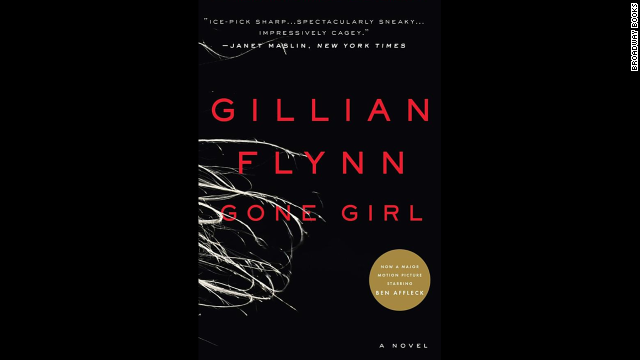 Book or movie? The book is "ice-pick-sharp," raved The New York Times' Janet Maslin. The movie? As of midday Thursday, it was getting a healthy 87% approval rating on RottenTomatoes.com. Verdict: The jury's still out.
Book or movie? The book is "ice-pick-sharp," raved The New York Times' Janet Maslin. The movie? As of midday Thursday, it was getting a healthy 87% approval rating on RottenTomatoes.com. Verdict: The jury's still out. 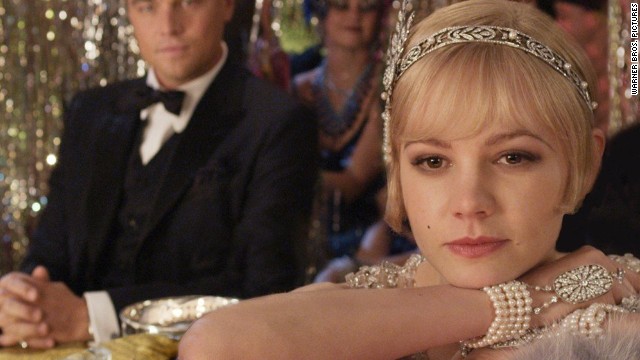 "The Great Gatsby": F. Scott Fitzgerald's classic Jazz Age novel is about a wealthy bootlegger, his old flame, her caddish husband and the trouble caused by their destructive relationships. It's been made into a movie several times, most recently a 1974 film starring Robert Redford and a 2013 film (pictured) with Leonardo DiCaprio and Carey Mulligan.
"The Great Gatsby": F. Scott Fitzgerald's classic Jazz Age novel is about a wealthy bootlegger, his old flame, her caddish husband and the trouble caused by their destructive relationships. It's been made into a movie several times, most recently a 1974 film starring Robert Redford and a 2013 film (pictured) with Leonardo DiCaprio and Carey Mulligan. 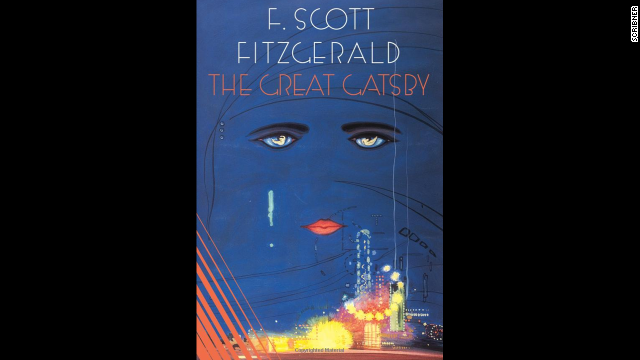 Book or movie? Almost 90 years after it was published, Fitzgerald's 1925 book remains one of the most powerful works of American literature, revered for its lyrical language and ability to capture its distinct time and place. The movies haven't fared as well: The 1974 film was criticized as stiff, and the 2013 version, though a box-office hit, polarized audiences and critics with Baz Luhrmann's feverish direction.Verdict: Book. It beats on, bearing us ceaselessly into the past.
Book or movie? Almost 90 years after it was published, Fitzgerald's 1925 book remains one of the most powerful works of American literature, revered for its lyrical language and ability to capture its distinct time and place. The movies haven't fared as well: The 1974 film was criticized as stiff, and the 2013 version, though a box-office hit, polarized audiences and critics with Baz Luhrmann's feverish direction.Verdict: Book. It beats on, bearing us ceaselessly into the past. 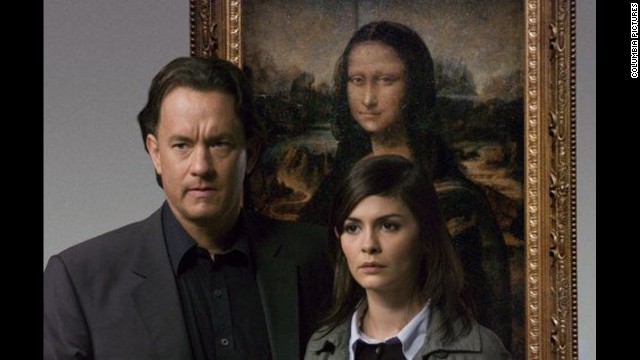 "The Da Vinci Code": Dan Brown's puzzle- and trivia-filled novel, a race against time with revelations about a religious conspiracy at its center, was a phenomenon when it was published in 2003: a huge best-seller that spawned a number of offshoot editions and copycat works. Ron Howard's 2006 film starring Tom Hanks and Audrey Tautou was also a major hit.
"The Da Vinci Code": Dan Brown's puzzle- and trivia-filled novel, a race against time with revelations about a religious conspiracy at its center, was a phenomenon when it was published in 2003: a huge best-seller that spawned a number of offshoot editions and copycat works. Ron Howard's 2006 film starring Tom Hanks and Audrey Tautou was also a major hit. 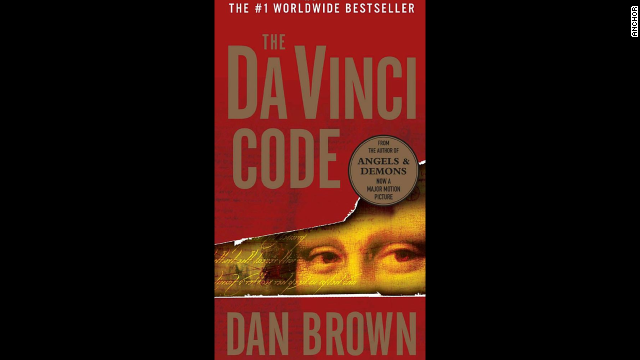 Book or movie? Brown's breathless prose -- "Code" has more than 100 brief chapters -- and fondness for cliffhangers led to some dismissive reviews. But even the critics admired his storytelling skill: "the worst book I ever loved," one person said in Salon. The almost three-hour movie, on the other hand, loses Brown's cheekiness. Only Ian McKellen as a Holy Grail scholar seems to be having any fun.Verdict: Book. You can read it faster, too.
Book or movie? Brown's breathless prose -- "Code" has more than 100 brief chapters -- and fondness for cliffhangers led to some dismissive reviews. But even the critics admired his storytelling skill: "the worst book I ever loved," one person said in Salon. The almost three-hour movie, on the other hand, loses Brown's cheekiness. Only Ian McKellen as a Holy Grail scholar seems to be having any fun.Verdict: Book. You can read it faster, too. 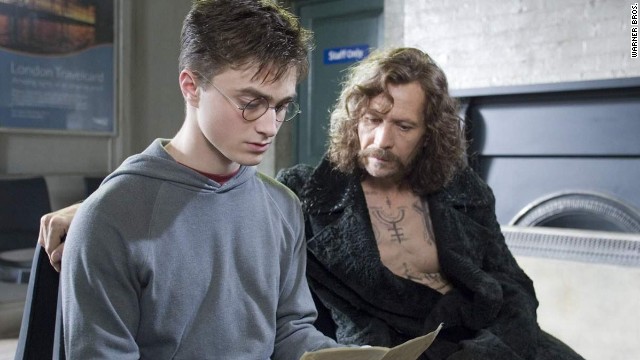 The Harry Potter series: J.K. Rowling's seven-book chronicle of a boy wizard, his life at a British boarding school and his battle against the evil Lord Vol -- uh, He-Who-Must-Not-Be-Named -- has enraptured children and adults since the first volume came out in the late '90s. The movie series, which earned a combined $7.7 billion worldwide, gave pretty much every actor in Britain a juicy role and made stars of its young leads, including Daniel Radcliffe (left, with Gary Oldman).
The Harry Potter series: J.K. Rowling's seven-book chronicle of a boy wizard, his life at a British boarding school and his battle against the evil Lord Vol -- uh, He-Who-Must-Not-Be-Named -- has enraptured children and adults since the first volume came out in the late '90s. The movie series, which earned a combined $7.7 billion worldwide, gave pretty much every actor in Britain a juicy role and made stars of its young leads, including Daniel Radcliffe (left, with Gary Oldman). 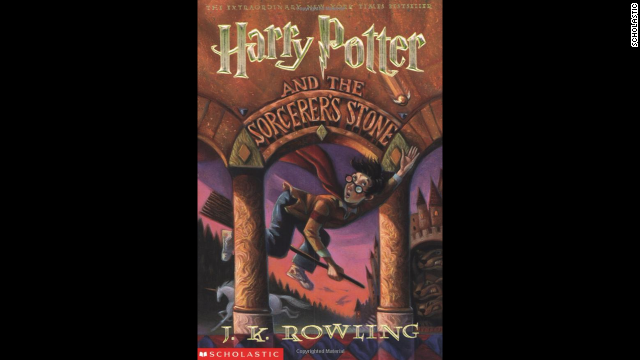 Books or movies? The early books benefit from Rowling's Pythonesque sense of humor and incredible imagination, but the last four -- all 600-plus-page doorstops -- could have used a stronger editor. On the other hand, the early films are dragged down by Chris Columbus' ham-handed directing, while the later ones briskly streamline plot and benefit from the growing confidence of its performers.Verdict: Early books, later movies.
Books or movies? The early books benefit from Rowling's Pythonesque sense of humor and incredible imagination, but the last four -- all 600-plus-page doorstops -- could have used a stronger editor. On the other hand, the early films are dragged down by Chris Columbus' ham-handed directing, while the later ones briskly streamline plot and benefit from the growing confidence of its performers.Verdict: Early books, later movies.  "Life of Pi": Yann Martel's Booker Prize-winning novel concerns the voyage of a spiritually minded teenage boy drifting across the Pacific with a large tiger named Richard Parker -- or does it? Ang Lee's 2012 film made Martel's "unfilmable" novel into an Oscar-nominated success.
"Life of Pi": Yann Martel's Booker Prize-winning novel concerns the voyage of a spiritually minded teenage boy drifting across the Pacific with a large tiger named Richard Parker -- or does it? Ang Lee's 2012 film made Martel's "unfilmable" novel into an Oscar-nominated success. 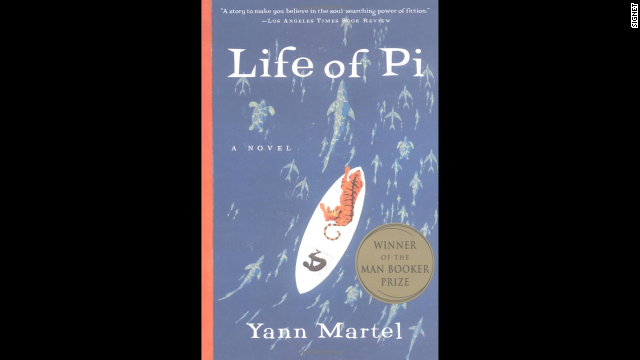 Book or movie? The book's whimsical side, which comes out most strongly in a section set in the Indian city of Pondicherry, is lost on screen. On the other hand, Lee is a master of the quietly awe-inspiring, which gives depth to the book's spiritual underpinnings. And Richard Parker is a computer-generated wonder to behold.Verdict: Book, but just barely. The movie can't measure up to the book's meditations, but it's a powerful work in its own right.
Book or movie? The book's whimsical side, which comes out most strongly in a section set in the Indian city of Pondicherry, is lost on screen. On the other hand, Lee is a master of the quietly awe-inspiring, which gives depth to the book's spiritual underpinnings. And Richard Parker is a computer-generated wonder to behold.Verdict: Book, but just barely. The movie can't measure up to the book's meditations, but it's a powerful work in its own right. 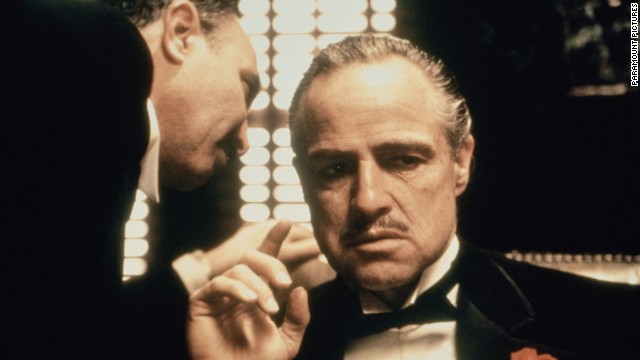 "The Godfather": Mario Puzo's 1969 novel chronicles the history of an immigrant and his family making their way in America as part of the Italian Mafia. It was made into an Oscar-winning 1972 film with Marlon Brando, and then expanded for 1974 and 1990 sequels.
"The Godfather": Mario Puzo's 1969 novel chronicles the history of an immigrant and his family making their way in America as part of the Italian Mafia. It was made into an Oscar-winning 1972 film with Marlon Brando, and then expanded for 1974 and 1990 sequels. 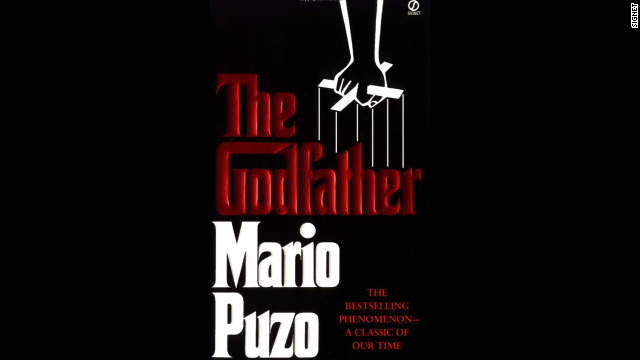 Book or movie? The book is pulpy goodness, an admitted bid for riches by Puzo, who was then better known as a literary author. But the movie is something else: a brilliant and influential picture, the wellspring of both notable careers (especially Al Pacino's) and so much of the gangster myth. It's no wonder the gang in "The Sopranos" knows it by heart.Verdict: Movie. It's one of the best ever made.
Book or movie? The book is pulpy goodness, an admitted bid for riches by Puzo, who was then better known as a literary author. But the movie is something else: a brilliant and influential picture, the wellspring of both notable careers (especially Al Pacino's) and so much of the gangster myth. It's no wonder the gang in "The Sopranos" knows it by heart.Verdict: Movie. It's one of the best ever made. 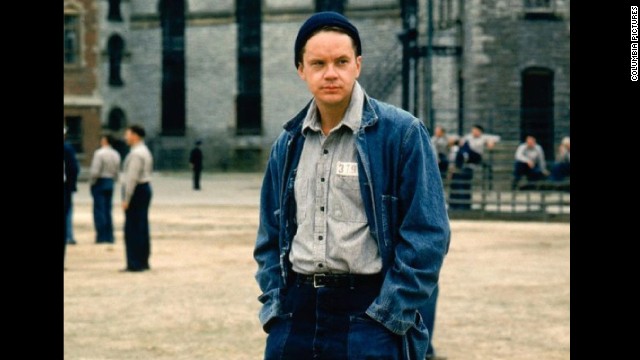 "The Shawshank Redemption": Stephen King's novella "Rita Hayworth and Shawshank Redemption" appears in his 1982 collection "Different Seasons." It's about a wrongly convicted banker who slyly figures out a way to escape from prison. Tim Robbins (pictured) plays the banker in the 1994 film; Morgan Freeman plays his convict friend, Red.
"The Shawshank Redemption": Stephen King's novella "Rita Hayworth and Shawshank Redemption" appears in his 1982 collection "Different Seasons." It's about a wrongly convicted banker who slyly figures out a way to escape from prison. Tim Robbins (pictured) plays the banker in the 1994 film; Morgan Freeman plays his convict friend, Red. 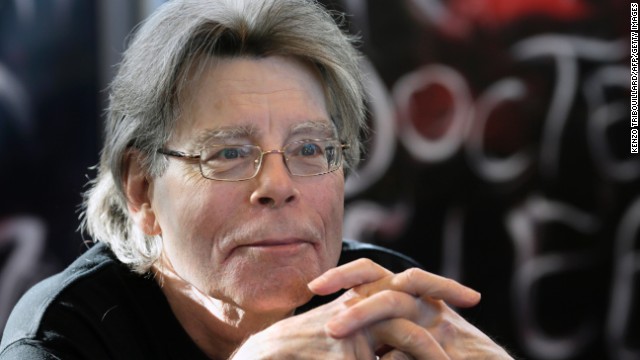 Book or movie? King's stories are often poorly translated to the screen, but "Shawshank," directed by Frank Darabont, gets everything right -- and then some. It has an eloquence and humor that King's version only hints at. It's no wonder that it regularly holds the No. 1 spot on IMDb's list of favorite films.Verdict: Movie.
Book or movie? King's stories are often poorly translated to the screen, but "Shawshank," directed by Frank Darabont, gets everything right -- and then some. It has an eloquence and humor that King's version only hints at. It's no wonder that it regularly holds the No. 1 spot on IMDb's list of favorite films.Verdict: Movie. 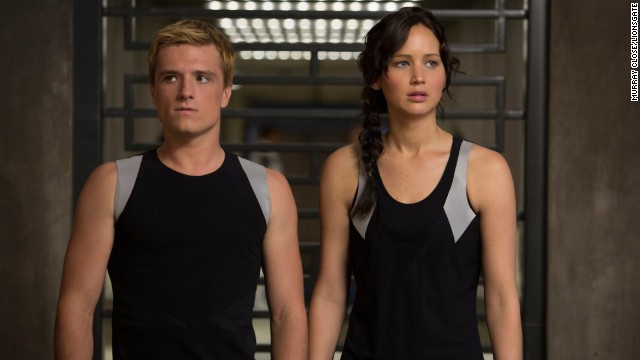 "The Hunger Games": Suzanne Collins' trilogy is set in Panem, a totalitarian U.S. successor. The Hunger Games are an annual competition in which adolescents from its 12 regions compete to the death to entertain the populace. The movies star Jennifer Lawrence (right, with Josh Hutcherson) in the lead role as Katniss Everdeen, whose cleverness and skills soon prove a threat to the ruling order.
"The Hunger Games": Suzanne Collins' trilogy is set in Panem, a totalitarian U.S. successor. The Hunger Games are an annual competition in which adolescents from its 12 regions compete to the death to entertain the populace. The movies star Jennifer Lawrence (right, with Josh Hutcherson) in the lead role as Katniss Everdeen, whose cleverness and skills soon prove a threat to the ruling order. 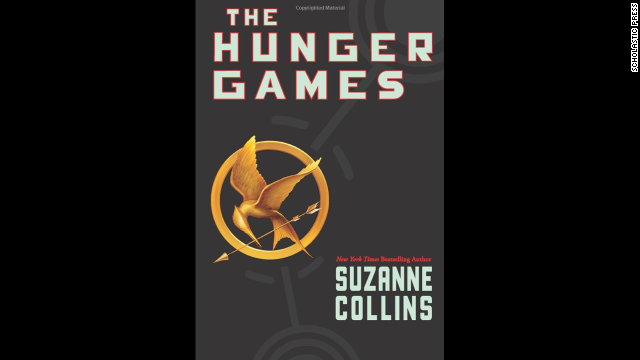 Books or movies? Among Collins' inspirations were the contrast between the Iraq war and trivializing reality shows such as "Survivor." So the deaths in the books -- of teenagers, remember -- feel genuinely tragic. The movies, to appeal to the widest possible audience, play down the horror and feel more like ... a reality show. It's a logical financial tradeoff, but thematically it hurts.Verdict: Books. Though the films do a beautiful job of imagining the world of Panem.
Books or movies? Among Collins' inspirations were the contrast between the Iraq war and trivializing reality shows such as "Survivor." So the deaths in the books -- of teenagers, remember -- feel genuinely tragic. The movies, to appeal to the widest possible audience, play down the horror and feel more like ... a reality show. It's a logical financial tradeoff, but thematically it hurts.Verdict: Books. Though the films do a beautiful job of imagining the world of Panem. 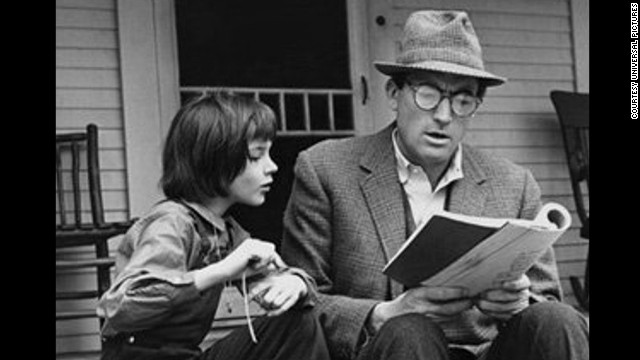 "To Kill a Mockingbird": Harper Lee's only novel, a huge best-seller, won the 1960 Pulitzer Prize for fiction. The story, told through the eyes of a child, is about race and justice in Depression-era Alabama, and lawyer Atticus Finch -- the narrator's father -- has become a model for a righteous, soft-spoken hero. The 1962 film is equally beloved and earned Gregory Peck an Oscar for his performance as Atticus.
"To Kill a Mockingbird": Harper Lee's only novel, a huge best-seller, won the 1960 Pulitzer Prize for fiction. The story, told through the eyes of a child, is about race and justice in Depression-era Alabama, and lawyer Atticus Finch -- the narrator's father -- has become a model for a righteous, soft-spoken hero. The 1962 film is equally beloved and earned Gregory Peck an Oscar for his performance as Atticus. 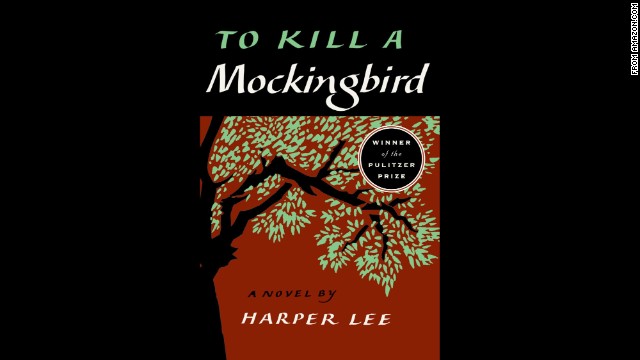 Book or movie? Both are classics. The book is a mainstay on high-school reading lists. The movie (with a script by Horton Foote) captured both the spirit and the setting of the book with fine performances and rich characterization. Verdict: Tie. You can't go wrong with either.
Book or movie? Both are classics. The book is a mainstay on high-school reading lists. The movie (with a script by Horton Foote) captured both the spirit and the setting of the book with fine performances and rich characterization. Verdict: Tie. You can't go wrong with either.  "The Cat in the Hat": Dr. Seuss' beloved children's book inspired a less-beloved, live-action 2003 movie with Mike Myers as the titular feline. To pad the slender book into a feature-length film, its creators added potty humor and subplots, including one with Alec Baldwin as a weaselly neighbor.
"The Cat in the Hat": Dr. Seuss' beloved children's book inspired a less-beloved, live-action 2003 movie with Mike Myers as the titular feline. To pad the slender book into a feature-length film, its creators added potty humor and subplots, including one with Alec Baldwin as a weaselly neighbor. 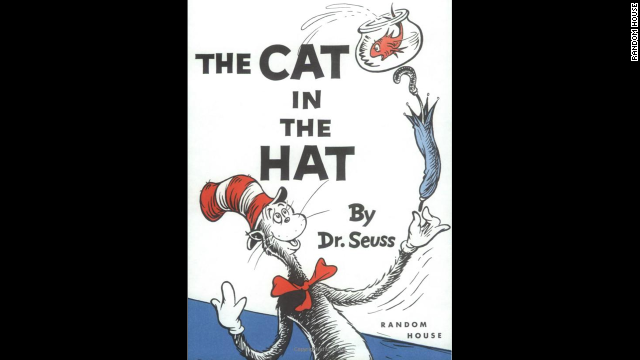 Book or movie? The book was published in '57. It's a slice of kid-lit heaven. The movie is more like cheesy dreck. We wanted more from the voice of Shrek! Verdict: Book, of course.
Book or movie? The book was published in '57. It's a slice of kid-lit heaven. The movie is more like cheesy dreck. We wanted more from the voice of Shrek! Verdict: Book, of course. 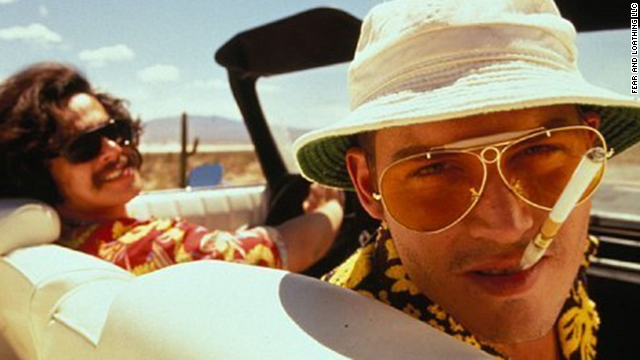 "Fear and Loathing in Las Vegas": Terry Gilliam's 1998 movie adaptation, gamely acted by Benicio del Toro and Johnny Depp, did its best to capture the gonzo spirit of Hunter S. Thompson's 1971 novel.
"Fear and Loathing in Las Vegas": Terry Gilliam's 1998 movie adaptation, gamely acted by Benicio del Toro and Johnny Depp, did its best to capture the gonzo spirit of Hunter S. Thompson's 1971 novel. 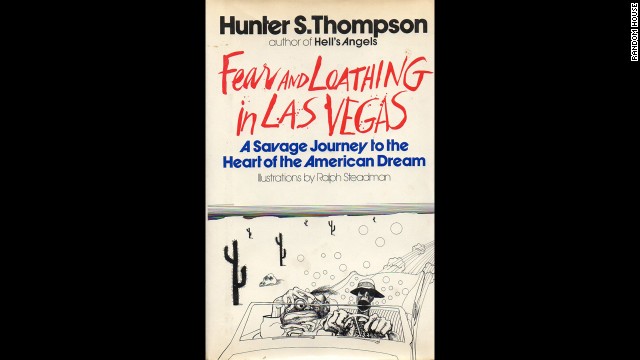 Book or movie? Although it's a worthy effort, Gilliam's movie doesn't match the delirious blend of Thompson's surreal prose and Ralph Steadman's whacked-out drawings. How do you follow a novel that begins, "We were somewhere around Barstow, on the edge of the desert, when the drugs began to take hold?" Verdict: Book.
Book or movie? Although it's a worthy effort, Gilliam's movie doesn't match the delirious blend of Thompson's surreal prose and Ralph Steadman's whacked-out drawings. How do you follow a novel that begins, "We were somewhere around Barstow, on the edge of the desert, when the drugs began to take hold?" Verdict: Book. 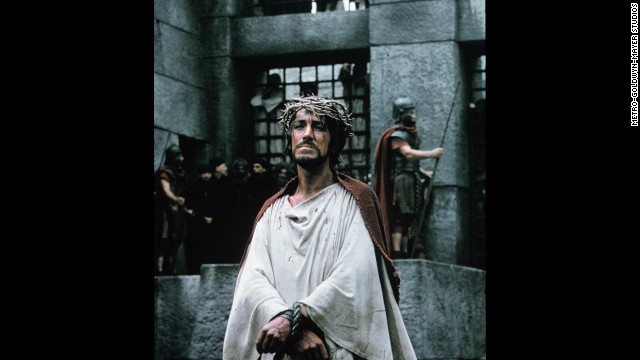 "The Greatest Story Ever Told": Max von Sydow plays Jesus Christ in this 1965 biblical epic, which originally clocked in at more than four hours. The sprawling, star-studded cast -- which critics said was distracting -- also includes Charlton Heston, Claude Rains, Telly Savalas, Roddy McDowall, Angela Lansbury, Sidney Poitier and John Wayne.
"The Greatest Story Ever Told": Max von Sydow plays Jesus Christ in this 1965 biblical epic, which originally clocked in at more than four hours. The sprawling, star-studded cast -- which critics said was distracting -- also includes Charlton Heston, Claude Rains, Telly Savalas, Roddy McDowall, Angela Lansbury, Sidney Poitier and John Wayne. 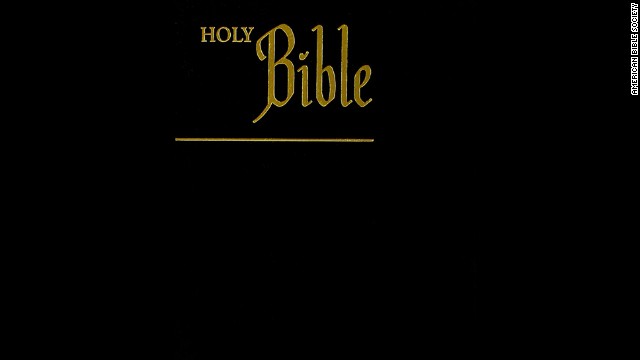 Book or movie? The film was adapted from a 1949 novel of the same name, which itself was based on the New Testament of the Bible. Verdict: Book. Are you serious?
Book or movie? The film was adapted from a 1949 novel of the same name, which itself was based on the New Testament of the Bible. Verdict: Book. Are you serious?  "The Bridges of Madison County": Robert James Waller's 1992 novel about the romance between a lonely Iowa farm wife and a National Geographic photographer lingered on bestseller lists for three years and sold 50 million copies. Clint Eastwood stars in (and directs) the 1995 movie version with Meryl Streep.
"The Bridges of Madison County": Robert James Waller's 1992 novel about the romance between a lonely Iowa farm wife and a National Geographic photographer lingered on bestseller lists for three years and sold 50 million copies. Clint Eastwood stars in (and directs) the 1995 movie version with Meryl Streep. 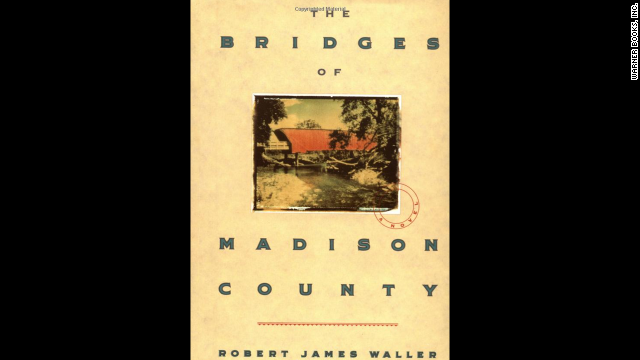 Book or movie? Although the novel made millions of readers swoon, critics rolled their eyes at its purple prose and hackneyed dialogue. Eastwood wisely tones down the book's overheated passages to tell a a mature, wistful and more effective love story. Verdict: Movie.
Book or movie? Although the novel made millions of readers swoon, critics rolled their eyes at its purple prose and hackneyed dialogue. Eastwood wisely tones down the book's overheated passages to tell a a mature, wistful and more effective love story. Verdict: Movie. 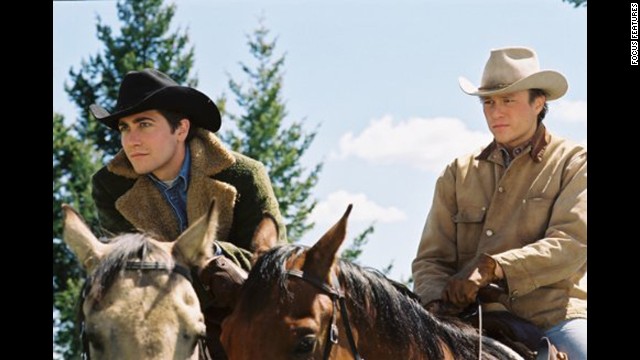 "Brokeback Mountain": Director Ang Lee, aided by a laconic script from Diana Ossana and Larry McMurtry, turned Annie Proulx's short story about the forbidden love between two Wyoming cowboys into a deeply affecting film. Jake Gyllenhaal and Heath Ledger (especially Ledger) earned raves for their performances, and both Lee and the screenwriters won Oscars.
"Brokeback Mountain": Director Ang Lee, aided by a laconic script from Diana Ossana and Larry McMurtry, turned Annie Proulx's short story about the forbidden love between two Wyoming cowboys into a deeply affecting film. Jake Gyllenhaal and Heath Ledger (especially Ledger) earned raves for their performances, and both Lee and the screenwriters won Oscars. 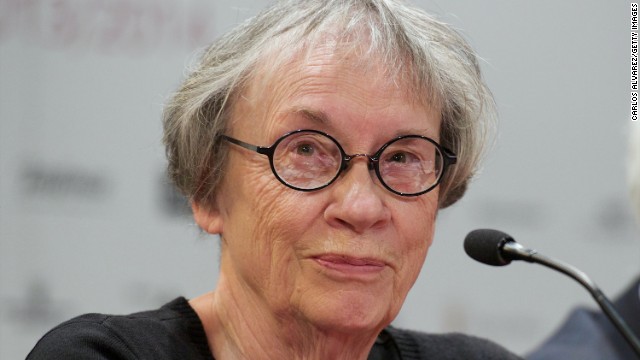 Book or movie? The spare, elegiac story by Proulx, shown here, made a splash when The New Yorker published it in 1997 (it was later included in her collection, "At Close Range." But as a slender story, it doesn't quite pack the resonant punch of a two-hour movie. Verdict: Movie, but it's close.
Book or movie? The spare, elegiac story by Proulx, shown here, made a splash when The New Yorker published it in 1997 (it was later included in her collection, "At Close Range." But as a slender story, it doesn't quite pack the resonant punch of a two-hour movie. Verdict: Movie, but it's close. 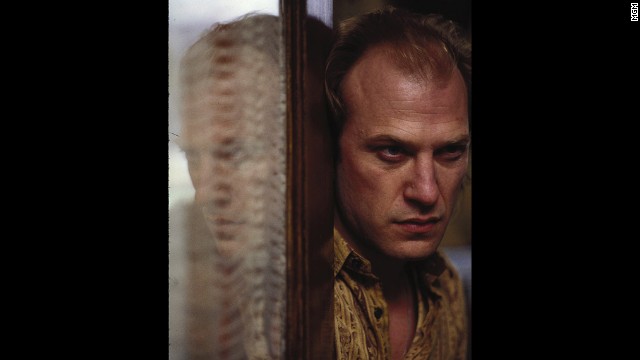 "Silence of the Lambs": Maybe the scariest movie ever to win the Oscar for Best Picture, it was skillfully adapted by Jonathan Demme from Thomas Harris' thriller about a young FBI agent and the seductive killer who helps her solve a series of murders.
"Silence of the Lambs": Maybe the scariest movie ever to win the Oscar for Best Picture, it was skillfully adapted by Jonathan Demme from Thomas Harris' thriller about a young FBI agent and the seductive killer who helps her solve a series of murders. 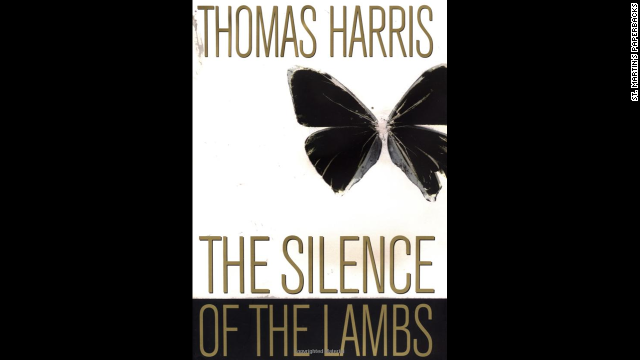 Book or movie? Harris' novel was a gripping read and a smart contribution to the growing serial-killer genre. But indelible performances by Jodie Foster and Anthony Hopkins -- and the riveting exchanges between them -- took the movie to a higher level. Hopkins, especially, turned Hannibal Lecter into one of the great villains in cinematic history. Verdict: Movie.
Book or movie? Harris' novel was a gripping read and a smart contribution to the growing serial-killer genre. But indelible performances by Jodie Foster and Anthony Hopkins -- and the riveting exchanges between them -- took the movie to a higher level. Hopkins, especially, turned Hannibal Lecter into one of the great villains in cinematic history. Verdict: Movie. 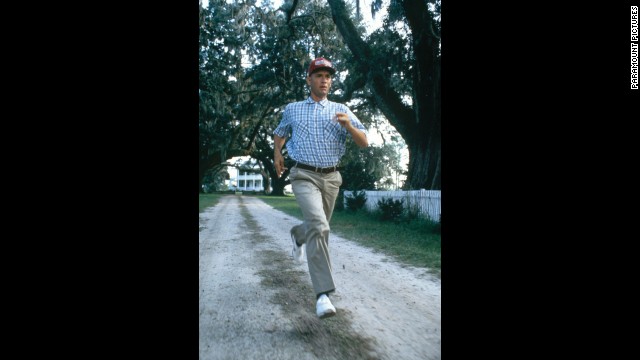 "Forrest Gump": Winston Groom's 1986 novel about the colorful life of an unusual Alabama man was little-known before Hollywood turned it into an epic journey through defining events of the late 20th century. The 1994 movie won Best Picture, earned Tom Hanks his second consecutive Oscar and became a cultural touchstone for such homespun catchphrases as, "Life is like a box of chocolates."
"Forrest Gump": Winston Groom's 1986 novel about the colorful life of an unusual Alabama man was little-known before Hollywood turned it into an epic journey through defining events of the late 20th century. The 1994 movie won Best Picture, earned Tom Hanks his second consecutive Oscar and became a cultural touchstone for such homespun catchphrases as, "Life is like a box of chocolates." 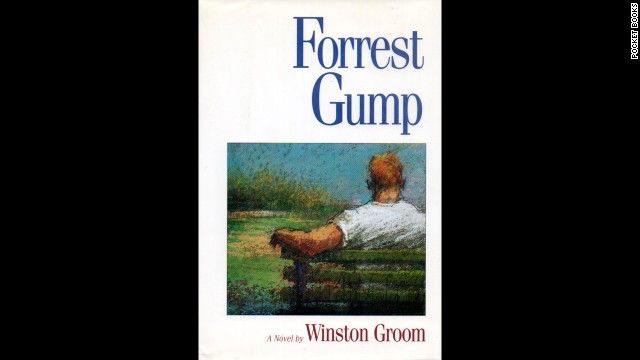 Book or movie? The filmmakers sanded away the novel's rough edges and made Forrest into a saintly figure. But they also wisely omitted some of the book's stranger chapters, such as when cannibals capture Forrest and hold him captive. Verdict: Movie.
Book or movie? The filmmakers sanded away the novel's rough edges and made Forrest into a saintly figure. But they also wisely omitted some of the book's stranger chapters, such as when cannibals capture Forrest and hold him captive. Verdict: Movie. 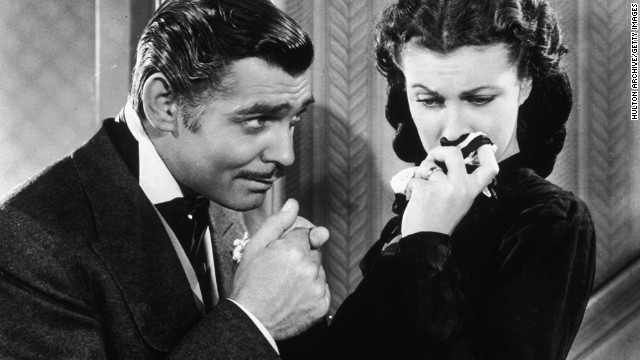 "Gone with the Wind": The first true Hollywood blockbuster, the 1939 film remains the most popular movie of all time when adjusted for inflation. Moviegoers swooned over the turbulent romance between roguish Rhett Butler (Clark Gable) and spoiled Scarlett O'Hara (Vivien Leigh), set in Georgia against the backdrop of the Civil War.
"Gone with the Wind": The first true Hollywood blockbuster, the 1939 film remains the most popular movie of all time when adjusted for inflation. Moviegoers swooned over the turbulent romance between roguish Rhett Butler (Clark Gable) and spoiled Scarlett O'Hara (Vivien Leigh), set in Georgia against the backdrop of the Civil War.  Book or movie? Audiences love Margaret Mitchell's sprawling 1,000 page novel and the movie. Some, however, criticize both for crude portrayals of African-Americans and a nostalgic depiction of slavery. Verdict: It's a tie.
Book or movie? Audiences love Margaret Mitchell's sprawling 1,000 page novel and the movie. Some, however, criticize both for crude portrayals of African-Americans and a nostalgic depiction of slavery. Verdict: It's a tie. 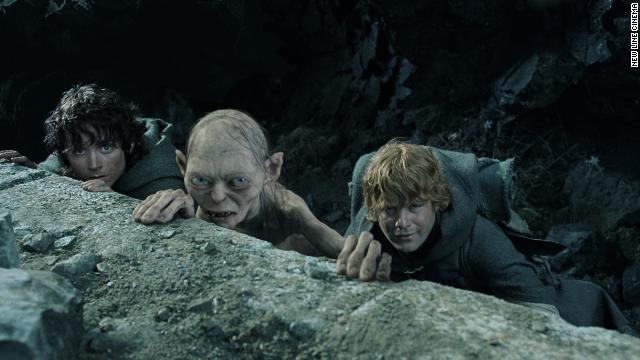 "The Lord of the Rings": J.R.R. Tolkien's trilogy -- a favorite for generations -- is about the denizens of Middle-earth and the pursuit of the powerful One Ring. It was turned into three films by Peter Jackson in 2001, 2002 and 2003. The last one went 11 for 11 at the Oscars, including a Best Picture win. Elijah Wood, Andy Serkis (in computer-generated form) and Sean Astin are among the stars.
"The Lord of the Rings": J.R.R. Tolkien's trilogy -- a favorite for generations -- is about the denizens of Middle-earth and the pursuit of the powerful One Ring. It was turned into three films by Peter Jackson in 2001, 2002 and 2003. The last one went 11 for 11 at the Oscars, including a Best Picture win. Elijah Wood, Andy Serkis (in computer-generated form) and Sean Astin are among the stars. 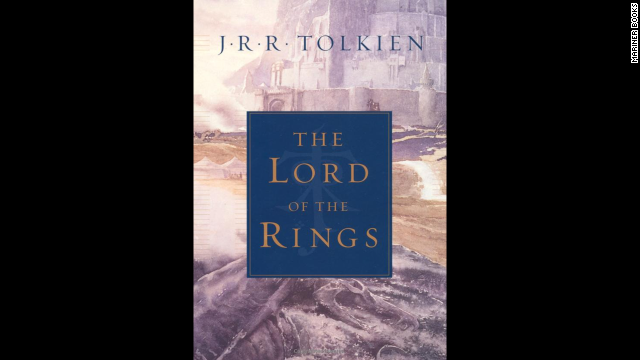 Books or movies? The books are undoubtedly classics, studied by aficionados as closely as the Bible. But Jackson's films, which combine excellent performances with amazing special effects, bring the books to life in a way that probably not even Tolkien could have imagined. They're majestic, funny and full of indelible imagines.Verdict: Movies. This isn't a slight of Tolkien, but a compliment to Jackson and all involved.
Books or movies? The books are undoubtedly classics, studied by aficionados as closely as the Bible. But Jackson's films, which combine excellent performances with amazing special effects, bring the books to life in a way that probably not even Tolkien could have imagined. They're majestic, funny and full of indelible imagines.Verdict: Movies. This isn't a slight of Tolkien, but a compliment to Jackson and all involved.
- "Gone Girl" was popular book; can movie live up to it and be a hit?
- Movies and books are two different forms; directors and writers have to make choices
- Some movies succeed more than others
(CNN) -- "Gone Girl" was that rarity: a best-selling book that was also well reviewed, earning spots on both The New York Times best-seller list and critics' best-of lists.
Will the movie starring Ben Affleck and Rosamund Pike which opens Friday measure up?
'Unfilmable' movies? No such thing, says Hollywood
It's hard to say. Early reviews have been positive, but some critics have reservations. The New Yorker's Anthony Lane highlighted the differing needs of books and movies as the reason for his mixed review.
While complaining about one of the film's subplots, he observed, "It comes straight from the novel, and you can picture the outcry if (director David) Fincher had chopped or changed it, but so what? A director's task is not to suck up to readers, or to flatter his source, but to imagine it afresh, as film, while seizing on those aspects that matter to him most."
It's a fine line. Let an adaptation leave out a character or condense a plot and book fans will scream in protest. But include every nuance, every tangent, and moviegoers will yawn with fatigue.
Studios will always rely on books -- they're an easy source for new stories. And many of those adaptations will end up as hit movies.
But that doesn't mean they're always done well. Check the gallery for some considerations of whether the book or movie did the job better.